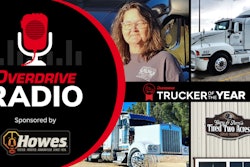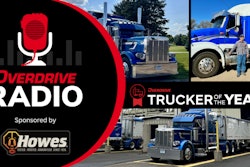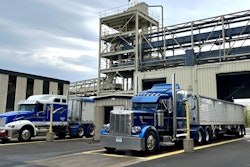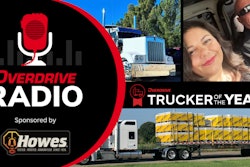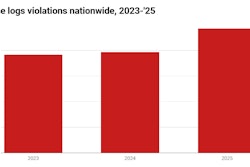In this week's Overdrive Radio podcast, drop into the second and final part of this series re-engaging with Overdrive's 2024 Trucker of the Year competitive field of owner-operators, with check-ins on how the year shaped up for each individual owner. Likewise, you'll hear plenty considered advice from each business owner for peers, particularly those with only short history in business or looking to get their start.
Words of encouragement, too, drawing on lessons learned from challenges overcome, and the plentiful nature of naysayers who will undoubtedly tell an aspiring truck owner to stay away. Play your cards right, and do the hard work early and often, noted owner-operator Greg Labosky, and you will be poised for profit. Use that "negative energy," as he put it, to "be willing to prove them wrong to the best of your ability to show them that you can, indeed, succeed."
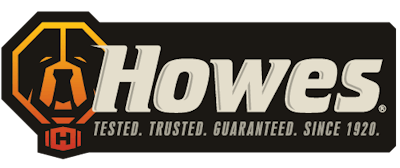 Overdrive Radio's sponsor is Howes, longtime provider of fuel treatments like its Howes Diesel Treat anti-gel and Lifeline rescue treatment to get you through the coldest temps, likewise its all-weather Diesel Defender and Howes Multipurpose penetrating oil, among other products.
Overdrive Radio's sponsor is Howes, longtime provider of fuel treatments like its Howes Diesel Treat anti-gel and Lifeline rescue treatment to get you through the coldest temps, likewise its all-weather Diesel Defender and Howes Multipurpose penetrating oil, among other products.

"Keep extremely good, tight bookkeeping to keep track of your expenses that you can control," he advised other owners, to help spot when something is out of line.
[Related: Success through self-help, lane change: 2024 Trucker of the Year 'exit interviews,' part 1']
There's growth on the horizon within the goals for Labosky's GDL Enterprise business, something Alpha Drivers Transportation owner Alec Costerus is already achieving, having started the year with just one truck. With fellow owner Joel Morrow in their Alpha Drivers Testing & Consulting side business, Costerus is building a dry van-pulling operation with growth this year and more to come, backed by tremendous efficiency gains to reduce costs.
"Holding the steering wheel is the easy part," he advised any prospective owner to realize. "There is a great deal more to the trucking business," urging careful study of all of those aspects.
Owner-operator Mike Nichols reported steady revenues through the year for his Wayne Transports-leased one-truck operation, with at once some unexpected downtime chipping a smidge away from that top line (including the results of a run-in with an unfortunate deer).
 Enter your business in Overdrive's Trucker of the Year competition for a chance to win prizes from sponsor Bostrom Seating, among other perks.
Enter your business in Overdrive's Trucker of the Year competition for a chance to win prizes from sponsor Bostrom Seating, among other perks.
Nichols offered considered advice for prospective owners about up-front saving as prep, building for a down payment but also reserves for unforeseen expenses that are inevitable. With respect to "start-up capital and down payment," he said, "you need to treat that like you would firewood. Save what you think you might need and triple it, if not quadruple it."
As for Daryl and Nelson Zimmerman, owners of Minnesota-based Zimmerman Ag, the brothers are very close to making good on goals set out at the beginning of the year to erect a new shop at headquarters, which will deliver opportunity for outside maintenance work during slow winter periods. More importantly, it stands to enhance their own in-house maintenance prowess to continue to get the job done for direct customers, the center of their ag-support two-truck business.
There's much more where all that came from in the podcast. Take a listen.
 Overdrive's Trucker of the Year program, sponsored by Commercial Vehicle Group and Bostrom Seating, recognizes clear business acumen and unique or time-honored recipes for success among owner-operators. Truckers of the Month contend for the Trucker of the Year honor, and finalists for the 2024 award will be named in December, with a winner crowned early next year. Nominations for 2025 are now officially open. Exceptional owner-operators, whether leased or independent, can enter to compete for the 2025 award via this link. Nominate your business or that of a fellow owner (up to three trucks) today. The 2024 winner will walk away with a custom replica of their tractor and a Bostrom seat from Commercial Vehicle Group, among other perks.
Overdrive's Trucker of the Year program, sponsored by Commercial Vehicle Group and Bostrom Seating, recognizes clear business acumen and unique or time-honored recipes for success among owner-operators. Truckers of the Month contend for the Trucker of the Year honor, and finalists for the 2024 award will be named in December, with a winner crowned early next year. Nominations for 2025 are now officially open. Exceptional owner-operators, whether leased or independent, can enter to compete for the 2025 award via this link. Nominate your business or that of a fellow owner (up to three trucks) today. The 2024 winner will walk away with a custom replica of their tractor and a Bostrom seat from Commercial Vehicle Group, among other perks.
Todd Dills: Hey everybody, it's Todd Dills back with another Overdrive Radio edition. This one for December 16, 2024, the second in this two part series reengaging with most of our 2024 Trucker of the Year competitive field of owner-operators with check ins on how the year shaped up for each individual owner. Likewise considered advice for peers from them among owners, particularly those with only short history in business or looking to get their start trucking. As with last week's exit interviews installment with 4 of our Trucker of the Year candidates, this week we've got a diverse set of highway haulers and business owners from the mostly hopper pulling agricultural support outfit of Zimmerman Ag, fronted by brothers Daryl and Nelson Zimmerman, the former nominated for the award by the latter recognizing his decade of excellence in service to direct ag customers doing what it takes.
Daryl Zimmerman: To get the job done. Gotta be there once they want something moved, being willing to work and get the job done when it needs done.
Todd Dills: We'll hear from Alpha Drivers Transportations Alec Costerus out of Colorado, who with fellow owner Joel Morrow back in Ohio, a growing team of employed drivers on both sides of the countries is building dry and pulling operation with further growth on the horizon backed by tremendous efficiency gains to control costs.
Alec Costerus: Actually holding the steering wheel is the easy part. There's a great deal more to the whole trucking business aspect beyond holding the steering wheel and load plannings and whatnot.
Todd Dills: Likewise, Connecticut based Greg Labosky, who's made strides with his one truck business in Amazon's contracting system by maximizing reliability with careful preventive maintenance, controlling costs with close record keeping to spot when something is.
Greg Labosky: Out blind, head on your shoulders and be able to be able to keep extremely good tight bookkeeping. Make sure you keep track of all your expenses, what you control and those that are fixed.
Todd Dills: Finally, considered advice for company drivers prepping for truck ownership from owner-operator Mike Nichols headquartered in Wisconsin and leased to Wayne Transports pulling dry bulk freight with pneumatic tankers.
Mike Nichols: As a company driver you need to be thinking about startup capital and down payment and I would just say that you need to treat that like you would firewood. save what you think you might need and then triple it, if not quadruple it.
Todd Dills: On the other side of a break, we'll dive in with Daryl Zimmerman for an update on one of his primary goals for 2024. Ever closer to full achievement, the building of a new shop at Zimmerman Ag headquarters to better equip the team for in house maintenance as well as opening new possibilities for winter Slow periods in Minnesota for outside maintenance work. Keep tuned.
Speaker 6: When winter hits hard and the thermometer plunges, your diesel engine needs serious protection. Howes Diesel Treat is your go-to for preventing fuel gelling and keeping water and deposits out all while lubricating your fuel system. But if your fuel gels because you forgot to treat or temps drop way below freezing, Howes Diesel Lifeline is ready to save the day. No need for mixing or filter changes. Both products are guaranteed and warranty safe. Trust Howes Diesel Treat and Howes Diesel Lifeline to keep your diesel running strong.
Todd Dills: Find more information at HOWES howesproducts.com
Here's Daryl Zimmerman with a candid answer to the question of well, how 2024 turned out for the business all told, here we go.
Daryl Zimmerman: Yeah, it, it went pretty good. kind of expected it. It wasn't as busy as sometimes but we kind of expected that for kind of the way the all the markets have been and everything going on out in the world. That kind of set us back a little bit, but overall it was real good.
The biggest goal I was reaching for this year was getting a shop up. Didn't quite get there yet, but still working at it.
Todd Dills: Yeah, well on the way for sure. We saw those pictures what you guys are working on there just a couple of months ago. And have you made more progress since then?
Daryl Zimmerman: Yeah, we got the, we're getting the frame ready to put up. We got that bunch of that laid out the structure. Okay, yeah, that's laying there ready to stand up so getting closer anyway.
Todd Dills: And that'll, that'll open up u some new opportunities right?
Daryl Zimmerman: Yep, for sure.
Todd Dills: Keep you guys out of the weather, one.
Daryl Zimmerman: Better than working in the blue sky shop now. Yeah, there's other little projects I could do for other people. During the winter we have plenty of time to work in there but during the summer it'd be not as much. During the summer we put in, put in a little longer days and with all the farming and stuff but during the winter definitely not as busy where we have more time at home there in the shop.
Todd Dills: Alpha Drivers Transportations Alec Costerus’ journey through 2024 showed some themes similar to Daryl Zimmerman’s in addressing the challenge of lower rates with a considered series of moves to build direct customer business. There's growth as a result on the near term horizon as you'll hear.
Alec Costerus: Well, the two biggest challenges that I think are hitting everybody Todd is obviously low freight rates and high fuel costs. So the challenge has been one of strategy. How do we operate the trucks? Capturing and leveraging our strengths. You know from an equipment standpoint, driver utilization standpoint, in light of those markets. So for example somebody who's living off the load board is probably dying on the vine because there is nothing, no value added that we as a company or a company could offer if you're just living off the load board. So we decided that we would be better off. first it was with Joel and Travis running together and now it's Travis and his brother Connor running together as a team. So we are able to provide a high level service, get some ah premium to the what I call the base rate. In that regard another strategy is been to … We brought one of the trucks out to Colorado where we work with a dedicated customer. So it's more of quality of service than quantity of service. So and I think those are keys that certainly has been a key to our survival. I can't say that we're making money hand over fist. I don't know that anybody is. and so the key has been to leveraged our various strengths.
Now doing that we are able to enhance our relationship with our customers. so we are actually adding to the fleet in what is normally considered a very difficult market environment. So we've been actually able to grow and prosper doing that. So we started the year with one. We added not that truck but that truck but we added what was once called Booberry and I didn't like the name, changed it to Blue Nova because it's kind of an R and D truck out here in Colorado and I've been driving that. We are in the process of hiring a driver for that truck. Sometime probably early January we're going to send that truck back to Ohio and that'll again go into a team operation. We bought two older 2015 trucks that we're going toa bring out to a. Excuse me. From Ohio to Colorado. It'll be running our dedicated customer business out here. Dedicated customers know they rely on quality of service, what I call service certainty because they want the reliability because people's livelihood depends on it. So I think that's been a key and we've apparently done a good enough job that they wanna give us more business and so we're gonna grow that our business on the east side. East side of the country is more of a traditional type of business. there'll be some dedicated customers. a lot of it is working with a major carrier that we've partnered up with. And that's where we do the team operation. Again, we're trying to leverage, you know, with the team operation. We want to do more drop and hooks so we're using customer trailers.
We don't have to wait for live unloads and loading situations or keep that to a bare minimum because that takes time and consumes log books and so on and leads to less productivity.
Todd Dills: New things on the horizon for alpha drivers transportation, no doubt. And congrats on successful pivots in the works to build business.
Owner-operator Greg Labosky too has his eye on growth, yet he's taking it slow for now. Steady as she goes as he works to enhance profitability in different ways, building mechanical knowledge to handle more maintenance himself. Labosky works entirely within Amazon's direct contracting system, as he notes in what follows about his 2024 experience.
Greg Labosky: So far with my company, I've been running exclusively the Amazon freight contract where so far we've been holding the rates themselves have not upticked the way I usually expect it to do. So especially towards the fourth quarter, we've been holding fairly steady our current breakdown right now with fuel costs added, I've been staying between 1.92 to around 2.10 per mile, including the fuel surcharge. So I've been maintaining the same overall. Not with the national averages, but in this day and age it's about to be what's expected. My overall long term was to try to get enough reserve to possibly think about adding a second truck. Right now at this point, I don't see that happening this year. Just by the way the market is. My long term is still in the long run to within a year two have two trucks running under my company. As far as my saving grace in the northeast, the fuel prices actually have been lower than what they started out with. So that's been my saving grace as far as maintaining my actual profitability.
My goal is overall is to do the majority of the work that I can do myself on my own. There are certain things though that I don't have experience in as far as doing airline work. Far as with the airbreak system, I have a little knowledge on that, but certain things I'd rather have someone that's more experience to take care of. But overall, the truck itself been maintaining its own. I've not had, knock on wood, any real Major issues this current year as far as any to breakdowns except for thefortunately the emissions control items where over time certain components do need to be replaced as far as sensors.
Todd Dills: Next up, Mike Nichols, leased to Wayne Transports and who in 2020 jumped on one of the last of the gliders in a Detroit Series 60 powered Freightliner Coronado. He's since put three and a quarter 100,000 miles on ring Dry Bolt Freight. Nichols reported a generally favorable year thus far from a revenue standpoint with some exception for extended time off with an unexpected bit of downtime involving an unfortunate deer.
Mike Nichols: Yeah, 2024 has been I guess I'm just going to call it interesting. you know top line revenue has not been as good as it has been in years prior. but that's not because of any market forces or lack of work. those things were kind of granular to me. I was off for a few weeks last winter with illness, injury and then later on in the winter I think in March or April I had a deer strike. so that put the truck down for a little while. Just long enough where you know my my downtime insurance wouldn't pick anything up. So you know how that works rightay. Like I was one day. I think I was one day short. but other than that though lately it's been it's been strong. I did. I was off for a week. I guess it's been about three weeks ago. I was off the entire week at the o. IDA board meeting.
I'm on the ballot this year for the election and have high hopes for that. But we'll see we'll see if the association feels the same. For the miles that I've ran. my per mile revenue has been right where it needs to be. You know, I think kind of as you know I'm interested in doing a few other things besides just putting the nose to the grindstowdin turning miles. I want, I want the trucking environment to be better for all of us and I want to do things that I can, that I can do within my, within my limited power. to make that happen. Done some more media and political outreach with my my state assemblywoman and state senators, federal lawmakers. You know, I'm m kind of anticipating that there'll be some some changes coming forward here in the next, you know, o. I don't know, two to say five years, in a post Chevron environment that, maybe some of these regulations might be curtailed a little bit.
Todd Dills: Nichols refers there to the quote unquote Chevron deference doctrine in the judicial system that in essence gave interpretive deference to federal agencies in crafting regulations in the absence of statutory clarity. That doctrine was essentially set aside by the Supreme Court this year, offering new possibilities for challenge to a bevy of rules and regulations, in some ways at odds or taking liberties with congressional statute. And look for nichels on the ballot for alternate board members if you're part of the Owner Operator Independent Drivers association. As was noted a couple of podcasts back when I spoke to Louis Pugh and OIDA president Todd Spencer. Otherwise, Nichols is still doing much the same work as he was when Matt Cole profiled the dry bulk Wayne Transport lease Owner operator earlier in the year.
Mike Nichols: Dry bulk. Pneumatic Wayne Transports Pretty, much just, pretty much Midwest. I get down, like I said, I just came up from Georgia, so I do get down there. Arkansas, you know, Ohio, we run things like that. I mean we have loads going everywhere. That's just kind of where I tend, to gravitate.
Todd Dills: Finally, we're going to let the tape roll on all four of these owners answers to the question of their best advice for relatively new and or aspiring owners. Given the many lessons learned throughout their careers in search of that elusive silver bullet, as it were, for truck ownership. Let's acknowledge, as does Alec Costerus to start, that there can be no silver bullet. But hopefully with the variety of advice here, there's going to be something you can glean. As noted, we started here with Alec Costerus Alpha Driver Transportation and will run straight into the voices of both Daryl and Nelson Zimmerman, then Greg Labosky and finally Mike Nichols. So these 2024 Trucker of the Year contender'best piece of advice for peers. Here we go.
Alec Costerus: Tough question and I don't know that there's a silver bullet, you know, and I was thinking about this. So one of the things that, I think has helped me along the way when I started in 2010, I was a sponge for knowledge. So for example, Kevin Rutherford was on SiriusXM that he now has a podcast. so I used to listen to a show. I think it came on at seven at night. Sometimes it would replay at midnight. And so I would listen to that and when the oil samples would come up and the guy would describe it and then I would try to guess what the answer was before Kevin answered. So, it was very educational. I do have a finance background, so the actual business wasn't that big of a challenge. But that probably is for most new truckers is the challenge. You know, actually holding the steering wheel is the easy part. There's a great deal more to the whole trucking business aspect beyond holding the steering wheel and load plannings and whatnot. And I think that's something that folks should concentrate on if they want to get on, on their own. If they want to be a company driver. Then learn everything about the actual logistics of being a good company driver. If you want to become, progress from company driver to maybe a leased owner operator. Meaning, you know, you lease your capacity onto like Landstar for example. Great, great career path because there are a lot of people that can support you and guide you. you've got services that are available, to help mentor those people. and then of course if you wanna m. Progress further and operate under your own authority, then you really have to have everything addressed. One of the things that Kevin talked about is having a team. So you know, having this relationships. So for example, earlier Greg talked about doing some service. So I am not a technical person. I can change shocks and things like that and do some minor electrical work or the alternator, radiator. Okay, fine. Some of the internal stuff that's beyond me. I can't handle it. so we've got people that can do those things. Accounting, tax, legal, those sorts of things. We can payroll now. we have providers that handle some of those things. So that's important as well. I guess it depends what one's goal is whether you want to be a company driver, which is a great way to start all the way through. Know being a true independent owner operator, operating under your own authority s a lot more responsibility as you progress from one to the other. So where you have a shortfall, you have to fill it in somehow.
Daryl Zimmerman: I work in that shop for like four years before I started trucking. So I kind of learned a lot there about trucks and how to work on them and stuff. So that, that goes a long way for owning trucks and doing your own maintenance and stuff.
Todd Dills: Saving money and just kind of being comfortable with the reliability there knowing that.
Daryl Zimmerman: Right.
Todd Dills: That you did it right yourself. Right?
Daryl Zimmerman: Yeah. Serving customers as best as you can and doing what it takes to get the job done. Got, gotta be there once they want something moved.
Nelson Zimmerman: Being willing to work and get the job done, what needs done. I've learned a lot of it off of Daryl and you Know he was in the business before I was so I took a lot of advice from him and yeah, he was a big part of it for me.
Greg Labosky: I see the biggest need for anyone either coming into the industry is far as as an owner operator is to have a good head on their shoulders and be able to be able to keep extremely good tight bookkeeping to make sure you keep track of all your expenses, what you can control and those that are fixed to try to make sure that you stay on the Prof. Side, have a good general background and being not willing to be closed minded, to be willing to listen to other people, have been in the business for a while and also be willing to talk to some mechanics. This way you have an idea of what is going on, you can bounce ideas off to people to try to minimize your actual overall expenditures on having to pay someone to do repairs in the long term and also be willing to to learn is the key to be able to listen to podcast and keep your knowledge base open and you will want to keep growing because if you stop growing you in all typ of purpose is dead because you have to be will to change and bend as needed and be willing to take your lumps on the road as far as if you make a mistake, be willing to pick yourself back up and keep progressing forward and be will to if you don't know something to pass along to get information from someone that you may know and just to be progressing down the road and do not overextend yourself beyond your means if you are willing to make the process work, just grow at your actual pace, not try to overextend yourself because if you're overreach, that's what causes most people to fail where they lay too much out ahead of time and when something bad occurs your collapsing FL on the road where you don't have to actual resources to try to pick yourself back up.
Mike Nichols: I would, I would have to say I echo just about everything that that I've heard you guys say. definitely be willing to learn you know when I've been in this business, you know in some facet of the truck in business for well over 30 years now and I still learn stuff every day. And so as soon as you think that you've mastered it and you know it all, you've resigned yourself to not learning anymore. And so you don't want to get to that point because there is somebody out there, many people out there that know something that you don't know. And I've always had that mindset and that's served me very well from you know, the time I got started in this business at the ripe old age of 18. you know, be willing to admit that you don't know and that you can't. There's some things that you can't do. Ah, emphasize and accentuate your strong, your strong characteristics, your strong suits. But but be willing to, you know, to admit where, where you fall short and establish good relationships, good relationships with vendors, all vendors. you know, people that can help you and people that will be synergistic with your business. you know, I would, I would have to, you know, I would, I guess I would go on to say I would recommend, you know, obviously not doing what I did. Don't, don't jump into this business by buying a truck. That's, that's generally not a, that's not a good idea. Of course that was a different business environment back then than it is now. But I would, I would absolutely advise somebody to have at least two years experience as a company driver and preferably three to five working in the business. Getting a sense of the huge responsibility, operating a Class 8 tractor trailer entails and also exploring which trucking subspecialty, the would be owner, operator, leased operator finds appealing as knowing that is critical to knowing how to spec your equipment. one thing I would definitely tell anybody that's up and coming is assuming that the would be owner operator or independ lease driver is not independently wealthy or otherwise connected with a family member established in the biz. as a company driver you need to be thinking about startup capital and down payment. And I would just say that you need to treat that like you would firewood. Save what you think you might need and then triple it. If not quadruple it and you'll be, you'll be thankful that you did. And you know, before you even think about going to a truck dealership and looking at trucks and falling in love with a shiny newer used truck, pull all three of your credit bureaus annual credit report, do Com. It's free. You can get a disclosure from each once a year. And you can do yourself a big favor by working on your credit score. because you know as, as a new truck operator, whether it's leased operator or someone with their own authority, you're going to be perceived as a higher risk both on the financing side and the insurance side. And having a higher credit score, say 720 or more will go a long way towards mitigating, those, those challenges, from the financing and insurance underwriter standpoint. And also then on that same note, don't accept the APR that's quoted by the dealership. Shop around and remember that the dealership will virtually always try to sell you on a rate that's higher than what you might otherwise qualify. And the other thing I would definitely advise is never, ever, never sign on to a lease purchase agreement. There's an inherent conflict of interest as the same entity financing your equipment is also the same entity paying your settlement. And in my view and experience, very few of those arrangements work to the benefit, of the owner operator. The lease purchase arrangement allows, the unscrupulous carrier to profit, you know, on an additional revenue stream and the bid loads for far cheaper than the more honest and often smaller carrier counterparts. that's probably my best advice to.
Todd Dills: Somebody that wants to own a truck, as have others. Throughout our reporting on resources around the nation for owner-operators, Nichols went on to encourage association membership, specifically referencing the Owner Operator Independent Drivers association where he'been a member for many years. Likewise, though independent carriers with authority can take advantage of of resources with membership at the national association of Small Trucking Companies and individual state trucking associations too present plenty in the way of resources and opportunities for networking, advocacy to the state and local lawmakers and more.
Before we end, a word of encouragement from owner operator Greg Labosky. That reminds me of something. 2023 Trucker of the year semifinalist Debbie Desiderato, longtime independent out of Virginia, something she had to say during the wrap of last years program. In essence, for any trucker pursuing success with an owner operator business, she had it. Never just lay down and give up, she said. Here's Greg Leboskis version of that to take us out through to the end.
Greg Labosky: Naysayers say that you would not be able to suced use all that negative information and negative energy that they are providing and be willing to prove them wrong to as best your ability to show them that you can indeed succeed.
Todd Dills: And you will with the right work put in. All of these men are living proof of that. Heres a big thanks to Labosky. Likewise Daryl and Nelson Zimmerman of Zimmerman ag, Alec Costerus of Alpha Drivers Transportation and owner operator Mike Nichols for their time and insight.

